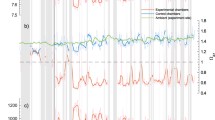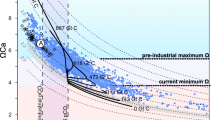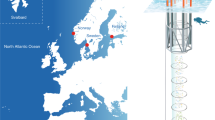Abstract
Experiments in which organisms are reared in treatments simulating current and future pCO2 concentrations are critical for ocean acidification (OA) research. The majority of OA exposure experiments use average atmospheric pCO2 levels as a baseline treatment. We conducted an ecoregion-scale analysis of global carbon chemistry datasets. For many locales, atmospheric pCO2 levels are not an appropriate characterization of marine carbon chemistry. We argue that atmospheric pCO2 should be disregarded when setting baseline treatment conditions and experimental design should rely on measurements of carbon chemistry in a study subject’s habitat. As carbon chemistry conditions vary with space and time, we suggest using a range of pCO2 values as a control rather than a single value. We illustrate this issue with data on the habitat of Euphausia pacifica, which currently lives in waters with a pCO2 around 900 μatm, a concentration much higher than the current global atmospheric mean.




Similar content being viewed by others
References
Andersson AJ, Mackenzie FT (2011) Ocean acidification: setting the record straight. Biogeosci Discuss 8:6161–6190. doi:10.5194/bgd-8-6161-2011
Barry JP, Tyrrell T, Hansson L, Plattner G-K, Gattuso J-P (2010) Atmospheric CO2 targets for ocean acidification perturbation experiments. In: Riebesell U, Fabry VJ, Hansson L, Gattuso J-P (eds) Guide to best practices for ocean acidification research and data reporting. Publications Office of the European Union, Luxembourg, pp 53–66
Brinton E, Ohman MD, Townsend AW, Knight MD, Bridgeman AL (1999) Euphausiids of the World Oceans. UNESCO Publishing and Expert Center for Taxonomic Identification
Collins S, Bell G (2004) Phenotypic consequences of 1,000 generations of selection at elevated CO2 in a green alga. Nature 431:566–569
Dupont S, Dorey N, Thorndyke M (2010) What meta-analysis can tell us about vulnerability of marine biodiversity to ocean acidification? Estuar Coast Shelf Sci 89:182–185
Dupont S, Dorey N, Stumpp M, Melzner F, Thorndyke M (2012) Long-term and trans-life-cycle effects of exposure to ocean acidification in the green sea urchin Strongylocentrotus droebachiensis. Marine Biol:1–9. doi:10.1007/s00227-012-1921-x
Feely RA, Sabine CL, Hernandez-Ayon JM, Ianson D, Hales B (2008) Evidence for upwelling of corrosive “acidified” water onto the continental shelf. Science 320:1490–1492. doi:10.1126/science.1155676
Feely RA, Alin SR, Newton J, Sabine CL, Warner M, Devol A, Krembs C, Maloy C (2010) The combined effects of ocean acidification, mixing, and respiration on pH and carbonate saturation in an urbanized estuary. Estuar Coast Shelf Sci 88:442–449. doi:10.1016/j.ecss.2010.05.004
Fitzer SC, Caldwell GS, Close AJ, Clare AS, Upstill-Goddard RC, Bentley MG (2012) Ocean acidification induces multi-generational decline in copepod naupliar production with possible conflict for reproductive resource allocation. J Exp Mar Biol Ecol 418–419:30–36
Green MA, Waldbusser GG, Reilly SL, Emerson K, O’Donnell S (2009) Death by dissolution: sediment saturation state as a mortality factor for juvenile bivalves. Limnol Oceanogr 54:1048–1059
Hendriks IE, Duarte CM, Alvarez M (2010) Vulnerability of marine biodiversity to ocean acidification: a meta-analysis. Estuar Coast Shelf Sci 86:157–164. doi:10.1016/j.ecss.2009.11.022
Hofmann GE, Smith JE, Johnson KS, Send U, Levin LA, Micheli F, Paytan A, Price NN, Peterson B, Takeshita Y, Matson PG, Crook ED, Kroeker KJ, Gambi MC, Rivest EB, Frieder CA, Yu PC, Martz TR (2011) High-frequency dynamics of ocean pH: a multi-ecosystem comparison. PLoS One 6:e28983. doi:10.1371/journal.pone.0028983
Joint I, Doney SC, Karl DM (2011) Will ocean acidification affect marine microbes? ISME J 5:1–7. doi:10.1038/ismej.2010.79
Key RM, Kozyr A, Sabine CL, Lee K, Wanninkhof R, Bullister J, Feely RA, Millero F, Mordy C, Peng T-H (2004) A global ocean carbon climatology: results from GLODAP. Global Biogeochem Cycles 18(GB4031):1–23
Kroeker KJ, Kordas RL, Crim RN, Singh GG (2010) Meta-analysis reveals negative yet variable effects of ocean acidification on marine organisms. Ecol Lett 13:1419–1434. doi:10.1111/j.1461-0248.2010.01518.x
Melzner F, Stange P, Trubenbach K, Thomsen J, Casties I, Panknin U, Gorb SN, Gutowska MA (2011) Food supply and seawater pCO2 impact calcification and internal shell dissolution in the blue mussel Mytilus edulis. PLoS One 6. doi:10.1371/journal.pone.0024223
Parker LM, Ross PM, O’Connor WA, Borysko L, Raftos DA, Pörtner H-O (2012) Adult exposure influences offspring response to ocean acidification in oysters. Glob Change Biol 18:82–92. doi:10.1111/j.1365-2486.2011.02520.x
Pörtner H (2008) Ecosystem effects of ocean acidification in times of ocean warming: a physiologist’s view. Mar Ecol Prog Ser 373:203–217. doi:10.3354/meps07768
Price NN, Hamilton SL, Tootell JS, Smith JE (2011) Species-specific consequences of ocean acidification for the calcareous tropical green algae Halimeda. Marine Ecol Prog Ser 440:67–78. doi:10.3354/meps09309
Sabine C, Key RM, Kozyr A, Feely RA, Wanninkhof R, Millero F, Peng T-H (2005) Global ocean data analysis project: results and data. Carbon Dioxide Information Analysis Center, Oak Ridge National Laboratory, US Department of Energy, Oak Ridge, Tennessee
Shamberger KEF, Feely RA, Sabine C, Atkinson MJ, DeCarlo E, Mackenzie FT, Drupp P, Butterfield DA (2011) Calcification and organic production on a Hawaiian coral reef. Mar Chem 127:64–75
Spalding MD, Fox HE, Halpern BS, McManus MA, Molnar J, Allen GR, Davidson N, Jorge ZA, Lombana AL, Lourie SA, Martin KD, McManus E, Recchia CA, Robertson J (2007) Marine ecoregions of the world: a bioregionalization of coastal and shelf areas. Bioscience 57:573–583. doi:10.1641/b570707
Sunday JM, Crim RN, Harley CDG, Hart MW (2011) Quantifying rates of evolutionary adaptation in response to ocean acidification. PLoS One 6. doi:10.1371/journal.pone.0022881
Takahashi T, Sutherland SC, Kozyr A (2011) Global ocean surface water partial pressure of CO2 database: measurements performed during 1957–2010 (version 2010). Carbon Dioxide Information Analysis Center, Oak Ridge National Laboratory, US Department of Energy, Oak Ridge, Tennessee
Thomsen J, Gutowska MA, Saphorster J, Heinemann A, Trubenbach K, Fietzke J, Hiebenthal C, Eisenhauer A, Kortzinger A, Wahl M, Melzner F (2010) Calcifying invertebrates succeed in a naturally CO2-rich coastal habitat but are threatened by high levels of future acidification. Biogeosciences 7:3879–3891. doi:10.5194/bg-7-3879-2010
Yu PC, Matson PG, Martz TR, Hofmann GE (2011) The ocean acidification seascape and its relationship to the performance of calcifying marine invertebrates: laboratory experiments on the development of urchin larvae framed by environmentally-relevant pCO2/pH. J Exp Mar Biol Ecol 400:288–295
Acknowledgments
We would like to thank Chris Sabine and Simone Alin at NOAA PMEL for helpful discussions on ocean carbon data sets.
Author information
Authors and Affiliations
Corresponding author
Additional information
Communicated by S. Dupont.
Electronic supplementary material
Below is the link to the electronic supplementary material.
Rights and permissions
About this article
Cite this article
McElhany, P., Shallin Busch, D. Appropriate pCO2 treatments in ocean acidification experiments. Mar Biol 160, 1807–1812 (2013). https://doi.org/10.1007/s00227-012-2052-0
Received:
Accepted:
Published:
Issue Date:
DOI: https://doi.org/10.1007/s00227-012-2052-0




